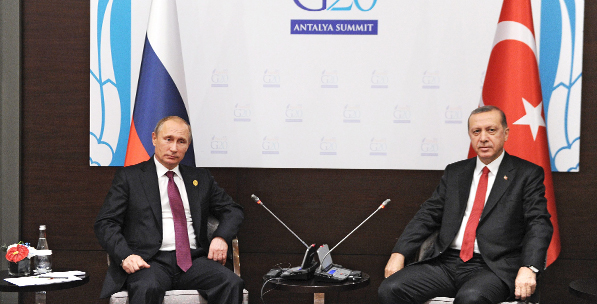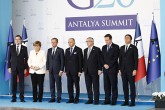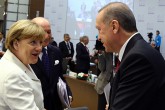Turkey aims to make its mark on the G20 summit held in its term presidency. President Recep Tayyip Erdoğan thinks that the summit in Antalya will draw a road map for future G20 summits. In addition to the decisions to be issued at the summit, I also think that important negotiations will take place at bilateral meetings between leaders. I believe that negotiations to be made with U.S. President Barack Obama, President Vladimir Putin of Russia and Saudi King Salman will be critical for new steps with regard to bilateral relations.
The only factor rendering this summit crucial for Turkey is not the fight against DAESH or other hot agenda topics to be discussed by leaders, including the refugee issue and the future of Syria. The summit is also the first international high-ranking meeting with Turkish political involvement in the aftermath of the Nov. 1 elections.
Having achieved ending the political turbulence thanks to the election results, Turkey now has the required strength and psychology to negotiate with foreign actors more comfortably.
Today, Turkey has a government that could realize political stability and economic reforms, which will make the following four years predictable.
It is evident that the Justice and Development Party’s (AK Party) opponents’ negative international campaigns will be less influential from now on. Even though criticism regarding the country becoming authoritarian with a lack of press freedoms will continue to be covered in the media, the discourses of dissident groups are in a gradual decline in terms of their influence.
Turkey obtained an international platform on which it could explain its determination in fighting the outlawed PKK’s terrorist activities. In the contrary case, the operation launched against the PKK’s self-government efforts in Silvan would have been reflected in a different way by the international media.
The G20 summit is an event at which Turkey’s new foreign policy steps, on Syria, will begin to crystallize. Syria is at the top of the agenda due to how the Arab uprisings evolved into an unending civil war in Syria, which undermined Turkey’s Middle East policy to a great extent. Moreover, Syria has always occupied the central position for the PKK’s activities to sabotage the reconciliation process and at inner political turbulence after 2013.
Ankara is now about to make new moves in foreign policy starting with Syria. The country is advocating the anti-DAESH fight and showing its determination to establish a safe-zone between Jarablus and Azez.
Establishing Turkish-U.S. relations on the grounds of new cooperation must be a prime concern in this new period. Agenda topics should be determinants in the progress of this cooperation, and Syria can be a good place to start.
For both parties, an effective anti-DAESH fight, backing the opposition in Syria and limiting the activities of the Democratic Union Party (PYD), the Syrian wing of the PKK, stand out as the leading conditions for larger-scale cooperation in Syria.
The U.S. policy of limiting the PYD’s activities continues with small but new steps. Firstly, Amnesty International criticized the PYD for its demographic changes. Afterward, the U.S. announced that it would not provide weapons assistance to the PYD and recently warned the organization against founding an autonomous region by putting an emphasis on Syria’s territorial integrity.
Other countries have also started to criticize the PYD’s activities. Lately, British Secretary of State for Defense Michael Fallon said the PYD’s attempt to force Arabs, Turkmens and Kurdish civilians to move to other places was unacceptable.
The process of integration with the EU is required to gather momentum with an initiative in Cyprus and some comprehensive reforms without devoting the process only to the refugee issue.
The Justice and Development Party (AK Party) government, which entered a new period with the Nov. 1 elections, has a chance to improve its capacities and institutionalization activities to reconstruct its foreign policy.
[Daily Sabah, November 17, 2015]
In this article
- Foreign Policy
- Opinion
- 2013
- 2015
- Civil War
- Cyprus
- DAESH
- Daily Sabah
- Democratic Union Party (PYD)
- Elections
- European Union (EU)
- Fight against DAESH
- Fight Against Terror
- G20
- Global Actors | Local Actors
- King Salman bin Abdulaziz al-Saud
- Kurdistan Workers' Party Terrorist Organization (PKK)
- Middle East
- Opposition
- PKK - YPG - SDF - PYD - YPJ - SDG - HBDH - HPG - KCK - PJAK - TAK - YBŞ
- Recep Tayyip Erdoğan
- Russia
- Saudi Arabia
- Syria
- Syrian Civil War
- Syrian Conflict
- Syrian Crisis
- Terror
- The President of the Republic of Türkiye
- Turkish President
- Türkiye
- Türkiye's Justice and Development Party | AK Party (AK Parti)
- United States (US)
- US President



